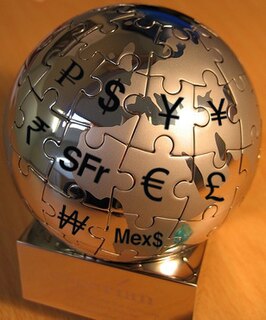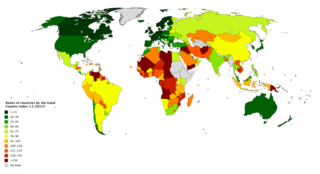Findings of the WIMF's second edition (2018)
State of moral freedom around the world
Only one country, the Netherlands, is classified as having the "highest" level of moral freedom by scoring slightly over the 90 points required for that label. Just four countries make it into the upper twenty points, and only ten pass the 75 point threshold. Out of the 160 countries considered, only 64 "pass the exam" and score 50 points or more. And around 30% of all countries fall in the "low", "very low" or "lowest" moral freedom areas of the index. Technology and the cultural globalization that it produces are deemed by the authors to be the most powerful driving forces towards acceptance of individual moral freedom.
Netherlands
With a three-point (three per cent) advantage over their closest competitor and eight points over the third, the Netherlands top the 2016 country ranking. The Dutch score is twenty-one points higher than the average of all countries enjoying "high" or "very high" moral freedom. For many decades, whenever moral freedom was discussed, the Netherlands had the least interventionist policies. The first country to fight human trafficking by legalising sex services performed by consenting adults, or to normalize the use of cannabis, or to acknowledge same sex marriage already in 2001, performs remarkably high in most indicators considered towards the index.
Latin countries
A trend may be inferred towards international unification of the legal and political approach to moral issues. And that trend favours the Western world's predominant choice for low moral interference by the state. This is particularly noticeable when looking at the index performance of many Latin European and Latin American countries, which seem to reveal a fast cultural evolution from traditional, conservative values into a laissez-faire approach to morality. Five of the top ten countries are Romance-speaking, while nine other Romance-speaking countries in Europe and the Americas make it to the "high moral freedom" region of the index. The particular performance of countries like Portugal or Uruguay is much higher than their recent history would indicate. These and other Latin countries seem to have discarded their traditional background of religiously influenced governance. Greece, while not a Latin country, shares a Mediterranean heritage with Latin countries and also makes it to the "high moral freedom" region.
Islamic countries and other religious-influenced states
The fifteen lowest scoring countries at the World Index of Moral Freedom are Islamic and located in the Persian Gulf, North-Eastern Africa and the Arabian Peninsula. This is also true for the region's economically free enclaves in the area. Saudi Arabia comes last (160th) in the ranking and doesn't even score ten points out of the one hundred potentially available. Only four predominantly Islamic countries obtain more than fifty points: Bosnia and Herzegovina, Albania, Turkey and Kazakhstan. A few non Islamic countries also show low levels of moral freedom which the authors consider likely to be due to a strong political leverage held by another religion.
Russia
In Russia, moral conservatism, derived from either the Orthodox faith or traditional culture, seems to have replaced Marxism as the basis for an ongoing, though softer, social engineering by the state. Russia's score is just in the middle of the classification, a position shared by some of her cultural and political allies, like Serbia, Moldova and Belarus. In all of these countries, the freedom of LGBT individuals is a matter of particular concern.
Communist countries
The remaining communist regimes coerce their citizens into abiding by a moral code based on allegedly scientific views. Freedom of conscience and the practice of any religion are repressed. In the case of the People's Republic of China, decades of limited economic liberalization have not resulted in an equally noticeable moral openness. Two other communist regimes, North Korea and Vietnam, fall further down into the low moral freedom area, while moral freedom is deemed insufficient in Laos and just slightly over the fifty point threshold in socialist Venezuela or in outright communist Cuba.
Other findings
For different reasons, often including abnormally low scores in a particular set of indicators, a few Western countries which perform reasonably high in other freedom indices rank rather low at the WIMF. Hungary and Norway fail to make it into the "high moral freedom" area, although just for under half a point. The British and Irish performance is particularly low within the moral freedom area, compared to the Anglo countries of North America and Australasia. Iceland, Japan, Poland and Romania barely manage to pass the fifty point mark. While most countries topping the WIMF in its first edition belong to the developed world, some countries with a lesser degree of development have also made their way into the higher classification areas. Cambodia, scoring just over seventy points, obtains the fifteenth place in the global classification and is the first developing country in the index. It is also worth noting that the four European micro-states considered −the principalities of Andorra and Monaco and the republics of San Marino and Malta− score surprisingly low in comparison with their bigger neighbours. In spite of their high living standards and economic freedom, these countries fail to perform similarly when it comes to moral freedom. A similar situation is observed in Caribbean and South Pacific island micro-states, which score poorly in most categories and rank in the lower areas of the WIMF classification. This similarity between very small countries in different regions, in spite of the cultural influence of their neighbours and allies, may lead to the conclusion that moral freedom is affected, among other relevant factors, by country size.

The Index of Economic Freedom is an annual index and ranking created in 1995 by conservative think-tank The Heritage Foundation and The Wall Street Journal to measure the degree of economic freedom in the world's nations. The creators of the index claim to take an approach inspired by Adam Smith's in The Wealth of Nations, that "basic institutions that protect the liberty of individuals to pursue their own economic interests result in greater prosperity for the larger society".

Economic freedom, or economic liberty, is the ability of people of a society to take economic actions. This is a term used in economic and policy debates as well as in the philosophy of economics. One approach to economic freedom comes from the liberal tradition emphasizing free markets, free trade, and private property under free enterprise. Another approach to economic freedom extends the welfare economics study of individual choice, with greater economic freedom coming from a larger set of possible choices. Other conceptions of economic freedom include freedom from want and the freedom to engage in collective bargaining.

Freedom in the World is a yearly survey and report by the U.S.-based non-governmental organization Freedom House that measures the degree of civil liberties and political rights in every nation and significant related and disputed territories around the world.
Economic Freedom of the World is an annual survey published by the Canadian think tank Fraser Institute. The survey attempts to measure the degree of economic freedom in the world's nations. It has been used in peer-reviewed studies some of which have found a range of beneficial effects of more economic freedom.
The State of World Liberty Index was a ranking of countries according to the degree of economic and personal freedoms that their citizens enjoy. It was a compilation of several similar indices created by other organizations. The index's original author Nick Wilson defined freedom as "the ability for the individual to live their lives as they choose, as long as they do not infringe on the rights of others to do the same."

The Democracy Index is an index compiled by the Economist Intelligence Unit (EIU), the research division of the Economist Group, a UK-based private company which publishes the weekly newspaper The Economist. The index is self-described as intending to measure the state of democracy in 167 countries, of which 166 are sovereign states and 164 are UN member states.

Global Peace Index (GPI) is a report produced by the Institute for Economics & Peace (IEP) which measures the relative position of nations' and regions' peacefulness. The GPI ranks 172 independent states and territories according to their levels of peacefulness. In the past decade, the GPI has presented trends of increased global violence and less peacefulness.
Ethics or moral philosophy is a branch of philosophy that involves systematizing, defending, and recommending concepts of right and wrong conduct. The field of ethics, along with aesthetics, concern matters of value, and thus comprise the branch of philosophy called axiology.
A number of indicators of economic freedom are available for review. They differ in the methods by which they have been constructed, the purposes to which they have been put, and the conception of economic freedom they embody.

The Ibrahim Index of African Governance (IIAG), established in 2007, provides an annual assessment of the quality of governance in African countries. Compiled by combining over 100 variables from more than 30 independent African and global institutions, the IIAG is the most comprehensive collection of data on African governance.

Freedom of the Press was an annual report on media independence around the world, published between 1980 and 2017 by US-based non-governmental organization Freedom House. It presented measurements of the level of freedom and editorial independence enjoyed by the press in nations and significant disputed territories around the world.
The Democracy Ranking is an index compiled by the Association for Development and Advancement of the Democracy Award, an Austria-based non-partisan organization. Democracy Ranking produces an annual global ranking of liberal democracies. The applied conceptual formula, which measures the quality of democracy, integrates freedom and other characteristics of the political system with the performance of non-political dimensions. Democracy Ranking has emphasized a broader understanding of democracy, creating a conceptual link between politics and the output and performance of society. The Democracy Ranking has compared several-year intervals, delivering ranking results, which show how ranking positions and score levels have developed recently. Referring to that information, a Democracy Improvement Ranking has been regularly released.
These are the international rankings of the United Kingdom.

The Gender Inequality Index (GII) is an index for measurement of gender disparity that was introduced in the 2010 Human Development Report 20th anniversary edition by the United Nations Development Programme (UNDP). According to the UNDP, this index is a composite measure to quantify the loss of achievement within a country due to gender inequality. It uses three dimensions to measure opportunity cost: reproductive health, empowerment, and labor market participation. The new index was introduced as an experimental measure to remedy the shortcomings of the previous indicators, the Gender Development Index (GDI) and the Gender Empowerment Measure (GEM), both of which were introduced in the 1995 Human Development Report.

The International Research and Exchanges Board’s (IREX) Media Sustainability Index (MSI) is a tool to evaluate the global development of independent media. The MSI is one of the most important indices "to assess how media systems change over time and across borders", in addition to the Freedom of the Press Index compiled by Freedom House and the Press Freedom Index compiled by Reporters Without Borders.

The Good Country Index measures how much each of the 163 countries on the list contribute to the planet, and to the human race, through their policies and behaviors.
North Korea ranks as the least democratic country in the world in The Economist Intelligence Unit's Democracy Index, while The Heritage Foundation and The Wall Street Journal's Index of Economic Freedom places the country as the one with least economic freedom. According to the Press Freedom Index, North Korea has the least free press in the world.
The V-Dem Institute is an independent research institute founded by Professor Staffan I. Lindberg in 2014 and is funded by a number of government organizations, World Bank and several research institutions.The headquarters of the project is based at the department of political science, University of Gothenburg, Sweden.










